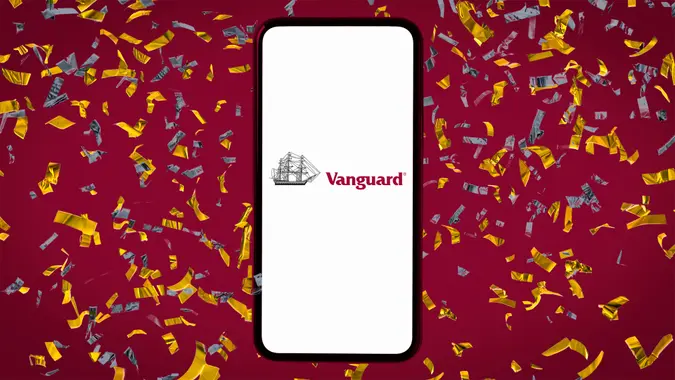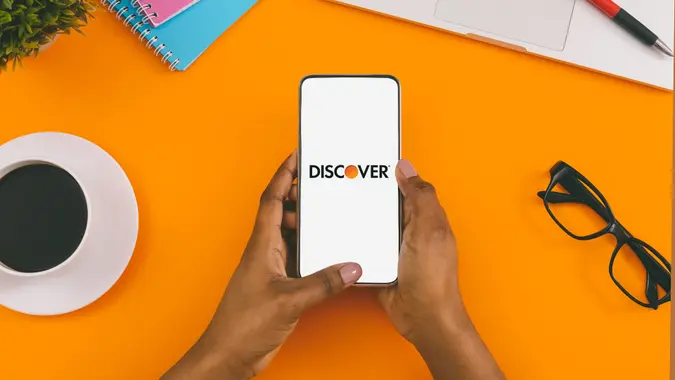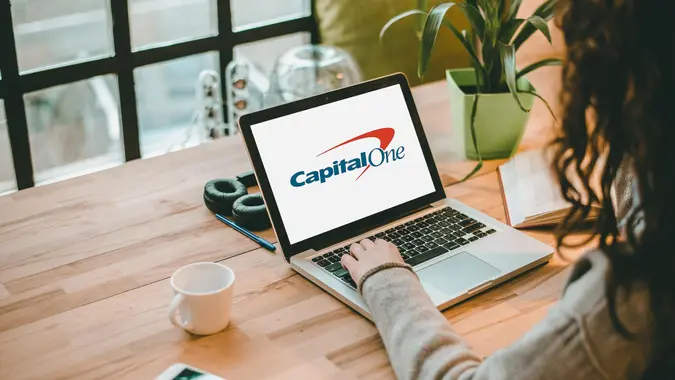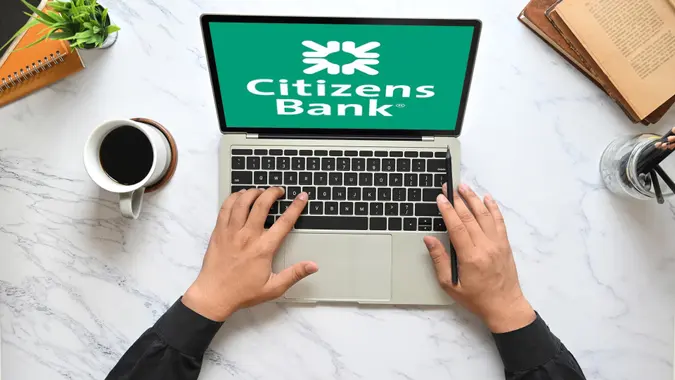11 Best 1-Year CD Rates Today: February 2026 — Earn Up to 4.15% APY

Commitment to Our Readers
GOBankingRates' editorial team is committed to bringing you unbiased reviews and information. We use data-driven methodologies to evaluate financial products and services - our reviews and ratings are not influenced by advertisers. You can read more about our editorial guidelines and our products and services review methodology.

20 Years
Helping You Live Richer

Reviewed
by Experts

Trusted by
Millions of Readers
A one-year CD might be the perfect place to stash your savings. Although the funds will be locked up for a full year, you will have the chance to earn a worthwhile amount of interest on your savings.
After the recent rate cut from the Federal Reserve, interest rates on one-year CDs are averaging 1.61% as of Feb. 6, 2026. However, the best one-year CD rate is APY, which you can find at USALLIANCE Financial.
Today’s Best 1-Year CD Rates
Here’s a glance at some of the best one-year CD rates:
| Bank or Credit Union | APY | Minimum Opening Deposit |
|---|---|---|
| USALLIANCE Financial | $500 | |
| E*TRADE | None | |
| Limelight Bank | $1,000 | |
| Popular Direct | $10,000 | |
| Home Savings Bank | $10,000 | |
| Capital One | None | |
| Live Oak Bank | $2,500 | |
| Sallie Mae Bank | $2,500 | |
| Synchrony Bank | None | |
| Bask Bank | $1,000 |
USALLIANCE Financial
- APY:
- Minimum opening deposit: $500
- Early withdrawal penalty: 180 days of dividends on the amount withdrawn
If you’re a member of USALLIANCE Financial, you can earn solid growth on your 1-year CD special at with a low minimum opening deposit of $500. Just be mindful of the early withdrawal penalties and meeting the eligibility requirements to become a member.
Pros
- Low minimum opening deposit
- Generous APY offering
Cons
- Withdrawals are subject to credit union approval
E*TRADE
- APY:
- Minimum opening deposit: $0
- Early withdrawal penalty: 90 days of simple interest
E*TRADE CDs benefit from daily compounding interest, plus no monthly fees or a minimum deposit requirement. Another perk is the 10-day rate guarantee, which allows you to lock in the higher rate based on when you opened the CD or when the account was funded.
Pros
- 10-day rate guarantee
- No minimum opening deposit requirement
- Online banking 24/7
Cons
- No physical bank branches
- Early withdrawal penalty may apply — contact customer service to begin the process
Limelight Bank
- APY:
- Minimum opening deposit: $1,000
- Early withdrawal penalty: 90 days of interest
Limelight Bank offers CD terms ranging from six months and up to 36 months. APYs are competitive, and you could earn on the 1-year CD and on the 6-month term. As an online-first and Utah-based bank, there are no branches to visit, but it offers services to customers nationwide. Limelight focuses its efforts on supporting eco-friendly and environmentally conscious efforts.
Pros
- Above average APYs on CDs
- Supports environmentally-friendly initiatives
- Utah-based, but serves customers across the country
Cons
- At least $1,000 minimum to open, which may be steep for some.
- No physical bank presence
Sallie Mae Bank
- APY:
- Account minimum: $2,500
- Early withdrawal penalty: Equal to 90 days of simple interest
Sallie Mae Bank offers a 12-month CD that pays APY. You’ll need at least $2,500 to open this account, which is the highest minimum deposit amount on this list. The early deposit penalty is decent, though.
Pros
- Good interest rate
- Lenient early withdrawal penalty
Cons
- High minimum opening deposit
- No physical locations
Popular Direct
- APY:
- Minimum balance: $10,000
- Early withdrawal penalty: 270 days of interest
Popular Direct offers CD term lengths ranging from three months to 60 months. The 12-month CD comes with an APY of . However, the minimum deposit requirement is relatively high. You’ll need to deposit at least $10,000 to lock in this attractive APY. Keep the early withdrawal penalty of 270 days of simple interest in mind.
Pros
- Wide range of terms available
- Solid APY offering
Cons
- High minimum deposit requirement
- Early withdrawal penalty may apply
Home Savings Bank
- APY:
- Minimum balance: $10,000
- Early withdrawal penalty: Three months’ worth of interest
Home Savings Bank offers CD terms with very competitive rates ranging between six months and up to 60 months. The minimum opening balance is fairly high, though, but it’s one of the highest available APY rates now for a one-year CD option.
Pros
- Competitive APY rate
- Fully online banking
- Utah-based, but online banking available
Cons
- High minimum balance required to open
Live Oak Bank
- APY:
- Account minimum: $2,500
- Early withdrawal penalty: 90 days of simple interest
Live Oak Bank offers nine different CD term lengths ranging from three months to five years. The highest APY available is tied to the 12-month CD option. You’ll need to deposit $2,500 to open a CD through Live Oak Bank. There is a maximum of $250,000 per account. Once you open the CD, you can let your interest accrue or have it disbursed monthly.
Pros
- Good interest rate
- Lenient early withdrawal penalty
Cons
- No physical locations
- High minimum opening deposit
Capital One
- APY:
- Account minimum: None
- Early withdrawal penalty: Three months’ worth of interest
Capital One 360 CD accounts offer terms ranging from six to 60 months. The lack of a minimum deposit requirement is especially enticing for depositors who want to start small. You can start building your savings through a CD even if you don’t have thousands of dollars to tuck into it.
Pros
- High interest rate
- No minimum opening deposit
- Lenient early withdrawal penalty
- Network of physical locations
Cons
- Compounded monthly, while some banks compound daily
Bask Bank
- APY:
- Account minimum: $1,000
- Early withdrawal penalty: 90 days of interest
Bask Bank offers six CD term lengths that range from three to 24 months. Its account minimum is decent, although not the lowest, and its early withdrawal penalties are manageable — it’s a good middle-of-the-road option.
Pros
- High interest rate
- Lenient early withdrawal penalties
- Compounded daily
Cons
- Other banks have a lower minimum opening deposit, but it’s not the highest on the list
- No physical locations
Synchrony Bank
- APY:
- Account minimum: None
- Early withdrawal penalty: 90 days of simple interest
Synchrony Bank offers a 12-month CD that pays APY. You don’t have to make a minimum deposit to qualify for this above-average interest rate.
Pros
- Good interest rate
- Lenient early withdrawal penalty
- No minimum opening deposit
Cons
- No physical locations
Barclays Bank
- APY:
- Account minimum: None
- Early withdrawal penalty: 90 days of interest
Barclays Bank offers a 12-month CD with a APY. If you open an account, you won’t need a minimum deposit, but you must transfer the funds into the account within 14 days.
Pros
- Good interest rate
- Lenient early withdrawal penalty
- No minimum opening deposit
Cons
- No physical locations
How Much Can You Earn on a 1-Year CD Right Now?
Your potential earnings for a one-year CD can be calculated if you know how much money you will initially deposit. This chart calculates how much you can earn on a one-year CD earning 4.00% APY with various deposit amounts:
| CD Deposit | Total Interest Earned in 1-Year CD at Maturity | Total Balance of 1-Year CD at Maturity |
|---|---|---|
| $1,000 | $40 | $1,040 |
| $5,000 | $200 | $5,200 |
| $10,000 | $400 | $10,400 |
One-Year CD Rate Movement Tracker
This chart shows how national average rates for one-year CDs fluctuated in 2025, using data from the FDIC.
| Month | National Average Rate of 1-Year CDs |
|---|---|
| February 2025 | 1.80% |
| March 2025 | 1.80% |
| April 2025 | 1.77% |
| May 2025 | 1.75% |
| June 2025 | 1.62% |
| July 2025 | 1.63% |
| August 2025 | 1.76% |
| September 2025 | 1.70% |
| October 2025 | 1.68% |
| November 2025 | 1.64% |
| December 2025 | 1.63% |
| January 2026 | 1.61% |
Are 1-Year CD Rates Going Up or Down?
The one-year CD rate slightly declined in 2025, and will likely continue to see drops in the future. That said, there have been some fluctuations, likely due to economic uncertainty.
CD rates go up or down because they are affected by the Federal Reserve’s decisions. CD rates rise when the Fed raises rates, and decline when the Fed starts cutting rates.
CD rates were very low during the COVID-19 pandemic, but rose significantly in 2022 and 2023 as the Fed raised rates to address inflation. When you look at historical CD rates, some banks even paid up to 5% APY for CDs during this time.
The Fed has been working toward lowering inflation to 2% while maintaining maximum employment and stable prices. In 2024 and 2025, the federal funds rate has been maintained for long periods of time, with interspersed rate cuts based on analysis of economic conditions.
Should You Open a 1-Year CD Today?
The best 1-year CD rates are likely to decline as overall interest rates decline, so now is a good time to lock in a rate.
A 12-month CD is a great solution for savers who want to lock in a relatively high rate for the short term. If you are confident you won’t need access to the funds, then a one-year CD could be the right choice.
But if you might need access to the funds, then the inflexible nature of a CD might make it a less-than-ideal choice for your situation. If you prefer more flexibility than a CD can offer, consider a high-yield savings account, a money market account or a T-bill instead. One option is to withhold your emergency fund in an accessible savings account and pour extra savings into a CD to tap into higher rates.
FAQs on 1-Year CD Rates
- Who has the best 12-month CD rate?
- USALLIANCE Financial has the best CD rate, paying APY on its 1-year CD special. There's $500 minimum balance required.
- Which bank gives 7% interest on a 12-month CD?
- There aren’t any banks that pay 7.00% APY on a 12-month CD. Financial Partners Credit Union does offer 0.00% APY on an eight-month certificate, though. You must qualify for membership to join.
- What is a good 1-year CD rate?
- A good 1-year CD rate is significantly higher than the national average rate of 1.61% for 1-year terms. Some of the highest 1-year CD rates are well above 3.50% APY.
Compare CD Rates
- Best 3-Month CD Rates
- Best 6-Month CD Rates
- Best 1-Year CD Rates
- Best 5-Year CD Rates
- Best No-Penalty CD Rates
- Best Jumbo CD Rates
- Best No-Penalty CD Rates
- Best CDs With No Minimum Deposit Requirement
- Best CD Accounts
Melanie Grafil, Daria Uhlig, Karen Doyle, Sarah Sharkey and Cynthia Measom contributed to the reporting for this article.
Rates are subject to change; unless otherwise noted, rates are updated periodically. All other information on accounts is accurate as of Feb. 6, 2026.
*Capital One interest rates accurate as of Feb. 6, 2026. See website for all current rates.
Editorial Note: This content is not provided by any entity covered in this article. Any opinions, analyses, reviews, ratings or recommendations expressed in this article are those of the author alone and have not been reviewed, approved or otherwise endorsed by any entity named in this article.
GOBankingRates is a personal finance and consumer interest rate website and an online marketing company serving top-tier banks, credit unions and other financial services organizations. Some companies mentioned in this article might be clients of GOBankingRates, which serves more than 100 national, local and online financial institutions. Rankings and roundups are completely objective, and no institution, client or otherwise, paid for inclusion or specific placement. Any opinions, analyses, reviews or recommendations expressed in this article are those of the author alone and have not been reviewed, approved or otherwise endorsed by the companies included in the article. All fees and rates are subject to change at the issuers’ discretion. Some interest rates might be short-term or promotional offers only, and it is possible additional terms and conditions must be met to obtain the interest rates listed. Rates and availability might vary by region. Verify terms and conditions before opening an account.
GOBankingRates bases its assessment of “best” and “top” products on the above-stated parameters to create a baseline for comparison. This assessment is an approximation of “best” and “top” designed to help consumers find products that might be appropriate for them. There could be other options available as well. Consumers should consider various options appropriate for their circumstances.
Our in-house research team and on-site financial experts work together to create content that’s accurate, impartial, and up to date. We fact-check every single statistic, quote and fact using trusted primary resources to make sure the information we provide is correct. You can learn more about GOBankingRates’ processes and standards in our editorial policy.
- FDIC. "National Rates and Rate Caps."
- Federal Reserve. "Federal Open Market Committee."
 Written by
Written by  Edited by
Edited by 

























